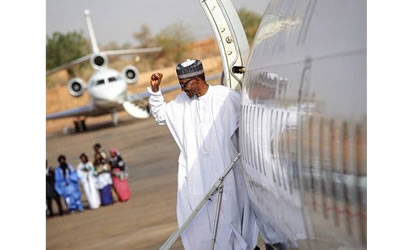PRESIDENT Muhammadu Buhari, his Liberian and Ghanaian counterparts, Ellen Johnson-Sirleaf and John Mahama, will, today, leave for Banjul, capital of The Gambia, to put diplomatic pressure on President Yahya Jammeh to transfer power to the president-elect, Adama Barrow.
The United Nations (UN) Security Council made the plan known while briefing newsmen after a closed-door meeting by the 15 members on the political situation in The Gambia.
Mr Juan Manuel De Linares, Deputy Permanent Representative of Spain, said the members of the council stood by their unanimous statement on December 10 that Jammeh should commence the peaceful transfer of power to Barrow without further delay.
“A delegation by the Special Representative of the UN Secretary-General to ECOWAS, Mohammed Ibn Chambas and other ECOWAS and AU leaders will lead high-level delegation to Banjul tomorrow.
“The delegation will include the president of Nigeria (Buhari), Liberia (Johnson-Sirleaf), Ghana (Mahama). These are respected presidents in West Africa and Africa,” Linares said.
He, however, said the council did not discuss any measure that would be taken should Jammeh refuse the entreaties.
“Our priority is to support the high-level visit tomorrow and ensure the mission succeeds,” he said.
He urged all parties in The Gambia to reject any form of violence and ensure peaceful transition of power in the West African country.
Ambassador Ismael Martins, Permanent Representative of Angola to the UN, also told the News Agency of Nigeria (NAN) that the high-level visit was an effort of the ECOWAS leaders.
In a statement on Saturday, the Security Council “strongly condemned the outgoing Gambian president’s rejection of the official election results proclaimed by the country’s Independent Electoral Commission.”
The council asked Jammeh “to respect the choice of the sovereign people of The Gambia, as he did on December 2 and to transfer, without condition and undue delay, power to the president-elect, Mr Adama Barrow.”
It also urged all parties to exercise maximum restraint, refrain from violence and remain calm, and requested that the security of Barrow and that of all Gambians be fully ensured.
However, tension is already building up in The Gambia as soldiers are seen placing sandbags in strategic locations across the capital, Banjul, a development said to have triggered widespread unease among the populace.
There had also been report of panic-buying of food before the vote, due to fear of unrest.
Witnesses told the Reuters news agency that there was particular nervousness about the president’s statement that he would deal harshly with any troublemakers who took to the streets.
Opposition spokeswoman, Isatou Touray, on social media, had also criticised a “violation of democracy” and called for people to “remain calm, lucid, vigilant and not retreat.”
The States Department of the United States, also in a statement, warned that Jammeh’s rejection of the results was an egregious attempt to undermine a credible election and remain illegitimately in power.
The British government also warned British holidaymakers in The Gambia to be on the alert, amid warnings that the West African nation was facing a potentially violent military coup.
Fears of unrest grew after Jammeh abruptly declared that he no longer respected the results of an election that ousted him from power a week ago.
Jammeh’s rejection of election result had pitched the country into instability, just at a time when thousands of British tourists are due to arrive for Christmas breaks on Gambia’s beach resorts.
Many more Britons live in retirement around the main tourist strip around the capital, Banjul, which has been developed into an African Coastal area in recent years.
Jammeh, the long-time president of The Gambia, had earlier been praised for conceding defeat to opposition leader, Adama Barrow, especially for his claim that the people had “decided that I should take the back seat.”
A former coupist, Jammeh, came to power in 1994 at the age of 29, after successfully staging a military coup. Before now he had won four previous polls.
Jammeh, now 51, had allegedly ruled through a bizarre personality cult of witchcraft and brutality.
Barrow’s victory in The Gambia’s presidential election would bring to an end Jammeh’s 22-year rule in the country.
Gambians voted by placing marbles into drums marked for each candidate.
Barrow received 263,515 votes while Jammeh won 212,099, Alieu Momarr Njai, the electoral commission head, said in the capital, Banjul, while announcing the results.
News of Barrow’s victory prompted thousands to take to the streets of Banjul in celebration, some on foot while others rode in cars and trucks and on motorbikes, as confused soldiers looked on.
“For many Gambians, this is the first time they have voted. They have only seen, for the last 22 years, one ruler. A lot of young people want to see change and a new ruler.
“Adama Barrow represents change; he represents hope for a lot of young Gambians,” Al Jazeera’s Nicolas Haque, reporting from Fatick in neighbouring Senegal, due to Gambian restrictions, said.
Barrow, in his first comments after the results came out, acknowledged the nation’s huge shift, saying “it’s time for work. It’s a new Gambia.”
An estate agent who worked as a security guard in Britain, Barrow was chosen as the opposition candidate by a group of political parties who had joined forces for the first time, rustling up unprecedented popular support.
However, only days after he conceded defeat to Barrow in a public address, Yahya Jammeh said he rejected the outcome of the election.
Jammeh’s rejection of election result had thrown the future of the West African country into uncertainty, as he said he was rejecting the election result due to unacceptable abnormalities.
“After a thorough investigation, I have decided to reject the outcome of the recent election. I lament serious and unacceptable abnormalities which have reportedly transpired during the electoral process,” Jammeh said, changing his position on the election results.
“I recommend fresh and transparent elections which will be officiated by a God-fearing and independent electoral commission,” Jammeh added.






